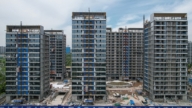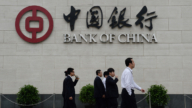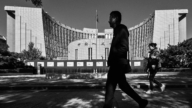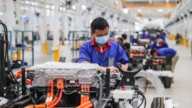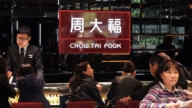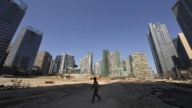【新唐人2013年12月02日讯】中国经历了四年的楼市调控,房价仍一路飙涨。从去年(2012年)初开始,北京房价已经连续上涨超过了20个月,仅在今年(2013年)9月的涨幅就高达20.6%。房地产企业宣称,企业缴交的各种税费占房价的7成,换句话说。在房价居高不下的情况下,当局至少收取了7成房价的税费。请看以下报导。
10月份,中国大陆70个大中城市房价,一线城市涨幅环比都超过了20%,21个城市涨幅超过10%,只有一个城市下跌。大陆《央视》节目指称,自2005年到2012年的8年间,全中国各类房地产企业“应交未交”的土地增值税总额,超过3.8万亿。
《央视》《土增税黑洞》系列报导,进一步将“应交未交土地增值税”的45家上市房地产企业进行排行。其中包括:SOHO中国、万科、华远等公司。
不过,有12家房企陆续发布公告,否认欠缴土地增值税。
24号晚,北京市“华远集团”总裁任志强驳斥《央视》的报导,随后又扬言要公开起诉《央视》。
任志强又向大陆媒体介绍说,房地产企业需要交纳的各种税费占房价7成,各种费用达180多种。
其实,早在去年(2012年)11月的“海西地产年会”上,知名经济学者郎咸平曾指出:“只要把房地产市场的各种税费取消掉,那么中国的房价马上下降70%。”
大陆金融分析师任中道:“高房价让老百姓买不起房子,所以民怨太大,导致群体事件也越来越多。谁都不想背这个黑锅,那怎么办呢?那只能所谓揭出内幕。”
英国《路透社》根据中共财政部资料指出,今年前9个月,中共各级政府的土地收入同比大增50%,达到2万7千亿元。
《路透》还根据大陆官方资料的估算,今年前10个月仅北京政府就出售了1490万平米土地,获利1200亿元,远高于去年全年的650亿元。
大陆媒体《21世纪经济报导》据“亚豪机构”的统计资料指出,北京的经营性用地大部分是央企、国企所拿,去年(2012年)北京房企商品房销售金额排行榜前十名中,国企也占了8家。
美国南卡罗莱纳大学艾肯商学院教授 谢田:“这些国企地产业首脑或者高级管理人员都是中共政府的官员、中共政府任命的,他们和中共实际上是互相利用、互相补充的关系。国企是中共赚钱的机器,而中共给国企提供了一种垄断性运作的机制。”
美国南卡罗莱纳大学艾肯商学院教授谢田指出,中共是高房价的罪魁祸首,官员在其中享受腐败﹔而房企是打手,也是利益集团的一环。
实际上,中共不断出台房地产的调控政策,各地还都有自己的地方政策,像北京就有“京十五条”,但北京房价连续上涨却超过了20多个月。
10月份全国70个大中城市新建商品住宅中上涨的就有69个,21个城市房价同比涨幅超过10%,一线城市北京、上海、深圳和广州同比涨幅都超过20%,价格同比下降的仅温州1个。
谢田:“中共根本没有这个愿望把房价给压下来,因为中国政府知道的很清楚,房地产市场跟股市一样,是他们一种从百姓身上掠夺资产、掠夺金钱的一个最好的机器。”
谢田表示,中共乐于推高房价,因为这不但可以提高中国的GDP,造成中国经济繁荣的假象,同时地方政府有政绩,还能掩盖腐败。
谢田指出,如果中共真正调控房地产市场、限制贪官手中的房子,房地产业马上就会崩溃,中国大量的房企、国有银行都会跟着破灭,随之而来的是中国社会的崩溃、和中共的崩溃,所以,中共绝不会这么做。这也是房价越调控越高的原因。
采访/易如 编辑/宋风 后制/舒灿
China Taxes Push Property Prices Up 70%
Despite four years of legislation in an attempt try
to rein in property prices in China, they keep soaring.
Since the beginning of 2012, Beijing’s
housing prices have escalating for 20 months.
In September this year, prices rose by 20.6%.
Chinese real estate claims taxes
accounted for 70% of the costs.
That means that the regime absorbs at least
70% of the high costs paid by the buyers.
The following is our news report.
In October, among 70 cities in China, first-tier cities
experienced more than 20% property appreciation.
21 cities had more than 10% appreciation
rate, and only one city had a drop in price.
According to state-controlled China Central Television
(CCTV) Chinese property developers have failed to
pay at least 3.8 trillion yuan ($624 billion) in land taxes.
This has happened during a period between 2005 and 2012.
In the CCTV reports on the black hole in land
appreciation tax (LAT), 45 firms were named.
They include SOHO, China Vanke, and Huayuan.
12 of these firms have denied the accusations.
On the evening of November 24, Ren Zhiqiang,
CEO of Huayuan Group, denied the reports
and vowed to file a lawsuit against CCTV.
Ren Xiang explains property prices include
70% of taxes, and accounts for more than
180 different types of fees and charges.
In November 2012, during a west coast real
estates conference, well-known economist
Larry Hsien Ping Lang commented on this.
“If you take out all the taxes,
China’s property will drop by 70%.”
Ren Zhongdao, financial analyst: “Prices are too high.
People of course complain, leading to more and more
mass protests, and no one wants to take the blame.
That’s why the hidden causes are being exposed.”
Reuters reported on data from China’s Finance Ministry.
Government land revenues rose 50 percent
from the previous year, to 2.7 trillion yuan
during the first nine months of this year.
Reuters calculated that the Beijing’s regime has sold 14.9
million square meters of land in the first 10 months this year.
This year, revenue from land
sales doubled to 120 billion yuan.
This is in comparison to last year’s 65 billion yuan.
21st Century Business Herald quoted
data from YaHao Real Estate.
It indicated that central and state-owned enterprises
occupy the majority of Beijing ‘s commercial land.
In 2012, state-owned enterprises made
8 of the top 10 real estate sales in Beijing.
Xie Tian, Professor of the School of Business, University
of South Carolina Aiken: “The executives of these state
owned real estates are appointed by the government.
They share mutual interests, to take
advantage, and to supply each other.
State-owned enteprises are a monopolising
tool for the Communist regime to use.”
Xie Tian indicates that the Chinese Communist
Party is the culprit of rising property prices.
Officials enjoy profit through corruption, and property
developers are also in the chains of the profit ring.
In fact, on top of the regime legislation to rein in
prices, local governments also have their own policies.
Beijing, for instance, issued 15 rules, but real
estate prices kept rising for more than 20 months.
In October, 69 out of 70 cities had
price increases in new housing.
21 cities rose more than 10% in
comparison to the same time last year.
Prices in first-tier cities, such as Beijing, Shanghai,
Shenzhen and Guangzhou rose more than 20 percent.
This is in comparsion to last year. Wenzhou
is the only city that had a drop in land prices.
Xie Tian: “The CCP has no desire to drive prices down.
The regime knows very clearly that the real estate
market, as well as the stock market, is the best
mechanism to take assets from the Chinese people.”
Xie Tian says that the CCP is actually
anxious to raise real estate prices.
It not only raises GDP, but also
creates the illusion of prosperity.
Local governments also get to praise its
own performance, to cover up corruption.
Xie Tian indicates that should the CCP regulate
the market and corrupt officials, real estate will
collapse, along with the collapse of property
developers, and the state-owned enterprises.
What will follow could be the collapse of
current Chinese society and the CCP system.
Therefore, the CCP will not regulate it, and
property prices will only get higher and higher.


